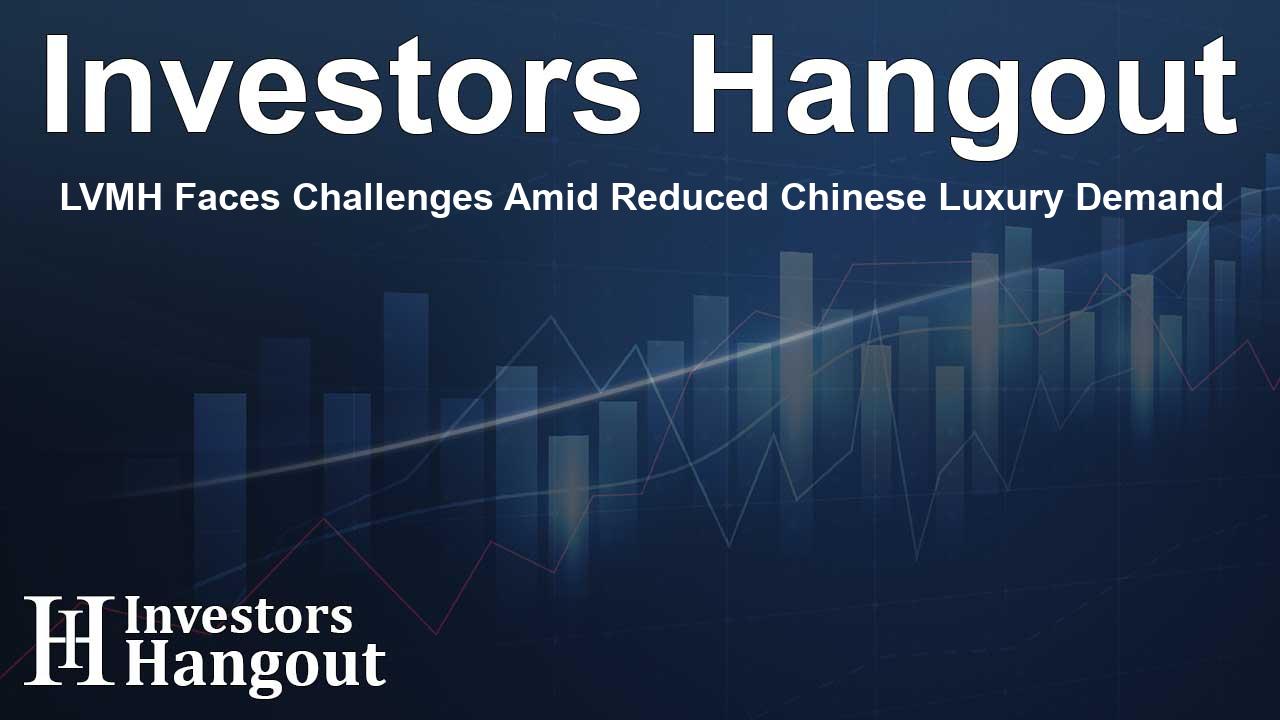LVMH Faces Challenges Amid Reduced Chinese Luxury Demand

LVMH Confronts Challenges With Chinese Luxury Demand
Investors in LVMH, a leading French luxury group, find themselves anxious about the current state of demand from Chinese customers. As the company approaches the crucial Singles Day shopping event, which is China's most significant annual sales period, there is a keen interest in whether recent fiscal stimulus measures will encourage affluent Chinese shoppers to spend on high-end items, including designer handbags priced around $4,300.
Current Market Trends in Luxury Goods
LVMH, renowned for its broad portfolio that includes illustrious brands like Louis Vuitton, Dior, Tiffany & Co., and Sephora, is due to announce its third-quarter revenue soon. Industry insights suggest that global luxury sales this year are projecting modest growth, with expectations of remaining flat or rising up to 4% at constant rates. However, the most significant slowdowns are evident in the Chinese market, where economic uncertainties have made middle-class consumers hesitant to indulge in luxury purchases.
Reactions from the Luxury Sector
As LVMH and other luxury brands, including Kering, Hermes, and Richemont, experience fluctuating stock performances, analysts at Bank of America have noted a palpable shift in consumer behavior. The sentiment is that luxury shoppers seem 'all shopped out,' indicating a cooling appetite that was previously fueled by strong growth in the Chinese market during the first half of the year.
Forecasts and Future Developments
Predictive measures suggest that the upcoming third quarter could represent a downturn for the luxury sector, with an anticipated 1% decrease in organic sales compared to the previous year. Earnings per share estimates for the next year have also seen a significant reduction, now about 17% lower than before.
Understanding Consumer Confidence in China
Markus Hansen, a portfolio manager at Vontobel, emphasizes a lingering 'lack of confidence' among Chinese consumers, particularly following declines in the nation's property market. Nevertheless, he believes that a slight revival in confidence could potentially reignite robust spending on luxury goods among Chinese shoppers.
Looking Toward Recovery
Analysts remain cautiously optimistic regarding the eventual recovery of Chinese luxury consumers, noting that forecasts expect a rebound in demand by 2025. In recognition of this potential, LVMH is taking strategic steps to expand its presence in the Chinese market, such as enhancing partnerships with e-commerce platforms like Alibaba. This collaboration aims to utilize Alibaba's expertise in cloud solutions and artificial intelligence. Additionally, LVMH's travel retail division, DFS Group, is working on a significant shopping and entertainment venture on China's tax-free Hainan island, which could draw more affluent shoppers.
Market Impact and Sales Predictions
Current challenges mean that luxury brands might face up to a 10% decline in sales in China this year, contrary to earlier expectations of modest growth between 5% to 6%. According to Patrice Nordey, CEO of a Shanghai-based consultancy, the issues affecting various consumer segments — from high-end consumers to the middle class and even Gen Z — compound the growth problem, leaving brands with a multitude of challenges.
Analysts Adjust Their Expectations
In light of these trends, TD Cowen analysts have recently revised their organic sales predictions for LVMH and its competitor Kering, forecasting growth of only 2.9% and a 10.4% decline, respectively. For Richemont, a modest 2% growth is projected for its second quarter, ending in September. Kering's reliance on the Chinese market, especially through its Gucci brand, makes it particularly vulnerable. The Asia-Pacific region — excluding Japan — is crucial for Kering, accounting for a significant portion of its revenue.
Gucci's Strategy and Market Relevance
With Kering set to announce its sales results soon, questions remain about the effectiveness of Gucci's recent shift towards 'timeless' styles, which may not resonate with consumers who are seeking more fashionable and trendy items that spark their interest.
Frequently Asked Questions
What are the current challenges facing LVMH?
LVMH is grappling with a decline in sales from Chinese consumers, driven by economic uncertainty and cautious spending behaviors.
How is LVMH responding to the slowdown in China?
LVMH is enhancing partnerships with e-commerce platforms and developing new shopping experiences in China to reignite consumer interest in luxury goods.
What is the outlook for the luxury goods market in China?
Analysts predict a potential rebound in luxury spending by Chinese consumers by 2025, but current forecasts indicate significant declines in 2023.
How are competitors like Kering and Richemont faring?
Kering and Richemont are also facing similar challenges, with revised predictions showing potential declines in organic sales.
What is the significance of Singles Day for LVMH?
Singles Day is a vital shopping period for LVMH, serving as a barometer for consumer sentiment and spending patterns in China.
About Investors Hangout
Investors Hangout is a leading online stock forum for financial discussion and learning, offering a wide range of free tools and resources. It draws in traders of all levels, who exchange market knowledge, investigate trading tactics, and keep an eye on industry developments in real time. Featuring financial articles, stock message boards, quotes, charts, company profiles, and live news updates. Through cooperative learning and a wealth of informational resources, it helps users from novices creating their first portfolios to experts honing their techniques. Join Investors Hangout today: https://investorshangout.com/
Disclaimer: The content of this article is solely for general informational purposes only; it does not represent legal, financial, or investment advice. Investors Hangout does not offer financial advice; the author is not a licensed financial advisor. Consult a qualified advisor before making any financial or investment decisions based on this article. The author's interpretation of publicly available data shapes the opinions presented here; as a result, they should not be taken as advice to purchase, sell, or hold any securities mentioned or any other investments. The author does not guarantee the accuracy, completeness, or timeliness of any material, providing it "as is." Information and market conditions may change; past performance is not indicative of future outcomes. If any of the material offered here is inaccurate, please contact us for corrections.